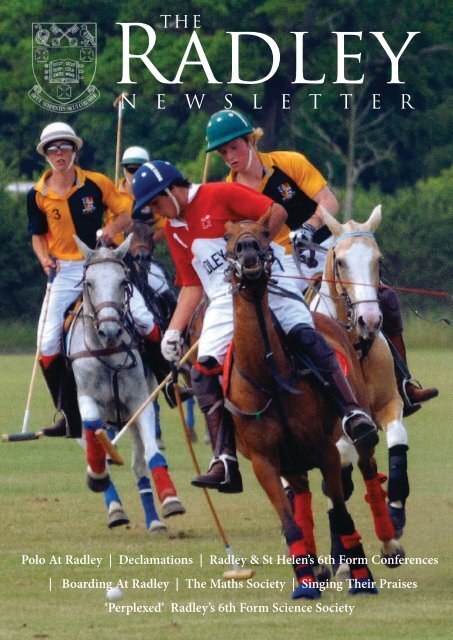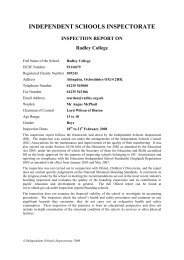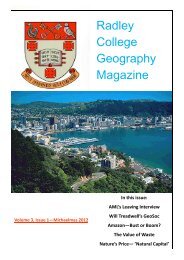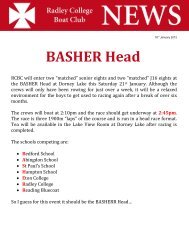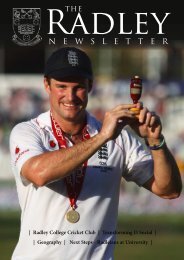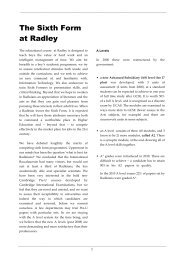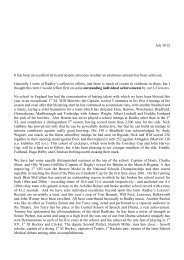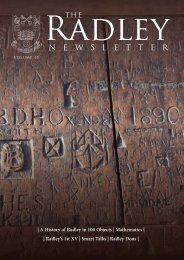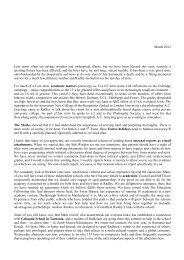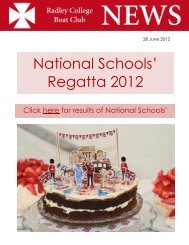N E W S L E T T E R - Radley College
N E W S L E T T E R - Radley College
N E W S L E T T E R - Radley College
Create successful ePaper yourself
Turn your PDF publications into a flip-book with our unique Google optimized e-Paper software.
<strong>Radley</strong><br />
THE<br />
N E W S L E T T E R<br />
Polo At <strong>Radley</strong> | Declamations | <strong>Radley</strong> & St Helen’s 6th Form Conferences<br />
| Boarding At <strong>Radley</strong> | The Maths Society | Singing Their Praises<br />
‘Perplexed’ <strong>Radley</strong>’s 6th Form Science Society
POLO PHOTOGRAPHS COURTESY OF MICHAELCHEVIS.COM<br />
polo at radley<br />
When one thinks of polo it is tempting to conjure up an image of privilege and exclusiveness of a sport open to only a very few.<br />
However, the reality is usually quite different and polo in schools has experienced a substantial growth in interest and support<br />
with more schools taking part in the National tournaments year in year out. It is also one of those sports which, were one to shy<br />
away from the risk of injury, one would normally exclude it from those on offer in any school. At professional level it is rated<br />
alongside paragliding by some actuaries in the insurance business. However, due to care and the skill of today’s school players<br />
remarkably few injuries occur.<br />
Polo is played differently according<br />
to the season. In the winter months, it is<br />
played in a walled arena with an inflatable<br />
ball the size of a small football. In the<br />
Summer, polo is played outdoors with a<br />
small hard ball the size of a hockey ball<br />
on a large ground which allows greater<br />
freedom of movement. Each player has<br />
a handicap which ranges from -2 to<br />
10 outdoors and 0 to 10 in the arena.<br />
In schools’ polo it is very unusual to<br />
encounter a player with a handicap of<br />
greater than 2 and most players normally<br />
play off -1 or 0. The difference in handicap<br />
of two competing teams is used to calculate<br />
an initial goal advantage and so you may<br />
find half-goals in the final score which arise<br />
from this.<br />
Because of the nature of the game and<br />
the demands that riders put on their ponies<br />
one enters into a complex world of tack<br />
where terms like surcingles, martingales<br />
and snaffles and Pelhams are bandied about<br />
amongst the initiated and between rider<br />
and groom. This is a game which often<br />
pushes ponies further than most other<br />
equestrian sports and the skilful player will<br />
limit the number of stops and turns which<br />
puts the greatest strain on the ponies.<br />
<strong>Radley</strong> polo, in recent years, has been<br />
based at Kirtlington Park where the <strong>College</strong><br />
enjoys the cooperation and support of those<br />
operating from there. In the winter season,<br />
matches are normally played at Inglesham<br />
Polo Club near Lechlade. Although lessons<br />
and chukkas take place during the week the<br />
majority of matches and all tournaments are<br />
played at weekends. To encourage others to<br />
try the sport there is a polo taster day where<br />
those who, in some cases, have not even<br />
ridden before have the opportunity to learn<br />
the basics.<br />
Polo at <strong>Radley</strong> has always enjoyed<br />
success of varying degrees and the <strong>College</strong><br />
enjoys the reputation of fielding teams to<br />
be reckoned with on the school circuit.<br />
Indeed, a number of Old Radleians who<br />
have played for the school have gone on<br />
to play in prestigious tournaments, most<br />
notably Malcolm Borwick (Cothill, A<br />
Social) who was captain for England this<br />
year playing off a handicap of 6 goals. It is<br />
one of <strong>Radley</strong>’s strengths that boys excelling<br />
in minor sports are given the opportunity<br />
and encouragement to pursue these. In<br />
polo we have been very fortunate to have a<br />
small group of dedicated and accomplished<br />
players. Their success can also be attributed<br />
to the generous support of committed<br />
parents who encourage and usually groom<br />
for their children to allow them to develop<br />
their game. It is clear that those pupils who<br />
have developed their polo skills through<br />
the Pony Club before coming to <strong>Radley</strong><br />
and continue to do so during their time<br />
here consistently rise to be our star players.<br />
Currently, two of our players Edmund<br />
Parsons (Winchester House, H Social) and<br />
Josh Nimmo (Arnold Lodge, D Social)<br />
have been selected to train in the junior<br />
development squad from which England<br />
players are selected; this is a considerable<br />
achievement.<br />
Looking back over recent years,<br />
<strong>Radley</strong> has taken the indoor and outdoor<br />
championships, the grand slam, twice in<br />
the past ten years. Also, in 2003 at Gaudy,<br />
thanks to the support from the grounds<br />
staff, the <strong>Radley</strong> team played a team of<br />
Old Radleians on the <strong>Radley</strong> pitches: an<br />
occasion which attracted much interest.<br />
The tradition of the <strong>Radley</strong> match with a<br />
team of ORs was born out of this event and<br />
now takes place annually.<br />
2 THE RADLEIAN NEWSLETTER
declamations<br />
Dennis Silk, <strong>Radley</strong>’s Warden from 1968<br />
to 1991, had a knack of attracting eminent<br />
visitors by connections that were less than<br />
obvious. Thus when in 1984 the Prime<br />
Minister came to open the refurbished<br />
Chemistry Labs it was not because she was<br />
a scientist by training, nor because she had<br />
been Secretary of State for Education, but<br />
because she was married to a distinguished<br />
Rugby Union referee. Likewise Ted Hughes<br />
came to judge Declamations in 1990 not<br />
because he was Poet Laureate but because<br />
he was a fishing chum from Hampshire<br />
waters. We are lucky to have had the last<br />
three Poets Laureate as Adjudicators<br />
(Motion, Hughes and Betjeman), and the<br />
widow (Jill Balcon) of a fourth.<br />
What then is Declamations that it<br />
attracts such eminent people (poets, actors,<br />
Headmasters, Heads of Oxford Houses)<br />
to come to judge it? It is a poetry reading<br />
competition. Every boy in the first four<br />
years of the school learns by heart a piece<br />
of poetry (prose is allowed but is a minority<br />
pastime) early in the Lent Term. Form<br />
Masters “judge” their Forms and send<br />
about a quarter of them to the Semi-Finals.<br />
These (30 to 40 boys in each year) are<br />
heard again by a panel of three dons and six<br />
or seven are selected for the Finals a week<br />
later when they perform in front of their<br />
peers and the Judge. (In VI-2, the A Level<br />
year, entry is voluntary but all who have been<br />
finalists in previous years are automatically<br />
entered at Semi-Final level). The standard is<br />
remarkably high and the range of the boys’<br />
choices is amazing. Certain writers are heard<br />
regularly, T.S.Eliot (frequently a winner),<br />
Larkin, Alan Bennett and Browning for<br />
instance, and certain others come in and<br />
out of fashion, examples being Sassoon,<br />
Owen and U.A.Fanthorpe. The Ant-Eater,<br />
The Lion and Albert and Talking Turkeys<br />
are all popular with Shells and Removes,<br />
but recent winning pieces have ranged<br />
from Shakespeare, Donne and Tennyson to<br />
Disraeli, Yeats and Heaney. Dover Beach is<br />
often up there in the Final and will surely<br />
win one day.<br />
As well as the range of literature we hear,<br />
what else is remarkable is the quality of the<br />
attention of the audiences. It is prime season<br />
for coughs and sneezes, and, to be honest,<br />
quite a few of the pieces are over the heads of<br />
quite a few of the audience, but the stillness<br />
and the concentration is total. The boys are<br />
there to be inspired and educated, yes, but<br />
they are there also to support their friends,<br />
and to recognise that here is being displayed a<br />
talent that they do not themselves all possess.<br />
And occasionally they are rewarded not just<br />
with the very good but with the sublime.<br />
Jamie Dykes (Summer Fields, F Social) with<br />
the closing pages of Paul Scott’s Staying<br />
On in 1988 and Arthur House (Sandroyd,<br />
B Social) with Prufrock in 2000 have<br />
transcended criticism utterly.<br />
The comment is often made that<br />
Declamations is “a very <strong>Radley</strong> thing”<br />
Other schools, notably Eton, have their<br />
speeches or recitation competitions, but<br />
no other school, to the writer’s knowledge,<br />
makes every boy go in for it. (And this<br />
happens, largely because of the enthusiasm<br />
of the Form Masters, with considerably<br />
fewer mutterings than you might expect).<br />
Intriguingly the event does not go back<br />
to the beginning of the school in 1847 but<br />
appears to have been founded by Warden<br />
Wilkes in the 1940s. All Wardens since<br />
have given the event their whole-hearted<br />
support and than the Silk Hall with its<br />
perfect acoustic and intimate atmosphere<br />
no better venue could be found. Your<br />
correspondent has had the pleasure of<br />
organising the event for the last sixteen<br />
years and finds things very flat each<br />
February once it is over. Fortunately Leave<br />
Away comes within a few days.<br />
CW Hastings<br />
THE RADLEIAN NEWSLETTER 3
adley and st helen’s<br />
This year’s Conference in November was the 11th year the two schools have<br />
collaborated and it was one of the best. The theme was ‘Nothing But the Truth’ and<br />
the aim was to encourage a becoming scepticism in boys and girls who would soon<br />
enough be voters and tax payers. So, Ann Widdecombe spoke on the corrosive effect<br />
of spin and on politicians’ manipulation and packaging of statistics before fielding<br />
some excellent questions. Craig Brown spoke of the satirist’s art, and higher purpose,<br />
in exposing cant and hypocrisy, and illustrated this from his Private Eye columns<br />
in which his ear for the absurdity of political language proved a hilarious interlude<br />
in a day of otherwise serious discourse. Craig Murray, formerly British ambassador<br />
to Uzbeckistan, offered a bleak insight into government deceit and raison d’etat,<br />
and Tom Holder, an Oxford undergraduate, was extremely popular with his young<br />
audience in entertainingly describing his brave stand – and that of others in Oxford –<br />
as part of Pro-Test, the movement inspired by outrage at the tactics of Animal Rights<br />
extremists engaged in obstructing scientific tests at Oxford University.<br />
A formula developed over the decade or<br />
so of such Conferences ensures that there<br />
is a balance in the day between listening<br />
to distinguished lecturers, and getting<br />
boys and girls involved themselves. Part<br />
of the latter process starts before the day<br />
of the Conference; a small editorial team<br />
produces the literature, the required<br />
background reading for all. And a week<br />
prior to the Conference day St Helen’s<br />
hosts an evening black tie Dinner Debate<br />
on a motion tied to the main Conference<br />
theme. On the day itself at <strong>Radley</strong>, boys<br />
and girls are grouped, sit and lunch<br />
together, and work on one particular<br />
aspect of the theme; in the afternoon all<br />
210 are involved in a floor debate skilfully<br />
managed by Ian Yorston, <strong>Radley</strong>’s Head<br />
of Digital Strategy. It is great preparation<br />
in public speaking and presentation<br />
skills. Another tradition is that a piece of<br />
drama on the year’s theme be performed<br />
at lunchtime. This time the cast of the<br />
college play A Few Good Men rehearsed<br />
for the 6th Forms the climactic scene<br />
when the truth of a cadet’s death is wrung<br />
from his commanding officer – and<br />
compelling courtroom drama it was.<br />
These Conferences started back in<br />
1996 when Lord Hurd led a team of a<br />
dozen or more <strong>Radley</strong> parents involved<br />
in European business in a day-long<br />
evaluation of the EU and the benefits – or<br />
otherwise – of the Euro. The passions<br />
aroused then seem an anachronism from<br />
where we are now; but the next year’s<br />
topic, the Media, remains as relevant<br />
now as it did then, focusing on media<br />
intrusion and the responsibility of<br />
journalists. Pandora Maxwell spoke with<br />
understandable feeling, Peter Taylor<br />
with integrity and Simon Hoggart with<br />
humour about ‘Trusting the Media’, and<br />
the boys and girls quizzed a panel of<br />
famous names at the end of the day.<br />
In 1998, drama pieces presented by<br />
pupils took centre stage, with extracts<br />
from Brave New World and Whose Life is<br />
it Anyway, being both of an exceptional<br />
standard and ideal for provoking debate<br />
on the theme of the ‘Ethics of Science’. A<br />
year later two journalists stole the show in<br />
the Conference on ‘Identity’, with Andrew<br />
Marr, BBC’s anchorman, talking on<br />
political identity and David Aaronovitch,<br />
now of The Times, talking on global<br />
communication. The theme transferred<br />
on into the new millennium when a<br />
new 6.2 considered ‘Defending Little<br />
England’, with Peter Jay and Fergal Keane<br />
prompting the boys and girls to debate on<br />
the nature of Englishness and the threats<br />
to national identity – again, six years later,<br />
what was said was almost prescient, for<br />
debates about Islam, the veil, immigration<br />
have revisited the territory mapped out<br />
in that Conference. Whereas it was too<br />
late with the programme for Conference<br />
2001 already planned around ‘Crime and<br />
4 THE RADLEIAN NEWSLETTER
6th form conferences<br />
Punishment’ (with excellent speakers on<br />
‘Retribution and Rehabilitation’ – Michael<br />
Beloff QC and Sir Stephen Tumin), 9/11<br />
did almost predictably shape that of 2002<br />
when the theme was ‘Terror’. At the heart<br />
of a passionately debated programme<br />
was the Palestinian Question, and few<br />
who heard her will forget the cold anger<br />
of Yasmin Alibhai-Brown, Independent<br />
journalist. The year after we attempted an<br />
‘Understanding of America’ a wonderful<br />
excuse for a day drenched in American<br />
politics, film and popular culture, and in<br />
2004 we focused on ‘Technology – Who’s<br />
in Charge?’, looking at the all-seeing<br />
invasion of Big Brother and the potent<br />
powers of the new technologies. And so to<br />
last year – ‘50 Ways to Change the World’.<br />
Unquestionably this brought the greatest<br />
pupil participation of all, with much<br />
heartening and heart-felt discussion of the<br />
plight of those less fortunate in the world.<br />
It was a huge topic encompassing Global<br />
Poverty, UK Deprivation and repression<br />
of Human Rights round the world. Julian<br />
Filochowsky and James Mawdesley were<br />
compelling speakers, and the afternoon<br />
debate was memorable for being the very<br />
first time <strong>Radley</strong>’s Theatre was used, as<br />
well as for the passion with which groups<br />
of boys and girls vied to ensure their<br />
particular ‘cause’ was prioritised in any<br />
global action plan to right injustice.<br />
The Conferences have flourished<br />
for a number of reasons. We have been<br />
very fortunate to have St Helen’s and<br />
St Katharine’s School Abingdon as our<br />
partner, as committed as we are to all<br />
the hard work and planning the events<br />
involve. We’ve been fortunate, too, to have<br />
teams of teachers from the two schools<br />
with imagination, and with contacts, to<br />
build the programmes year after year.<br />
Each Conference’s aftermath has had the<br />
same enthusiastic and grateful response<br />
from the boys and girls who took part<br />
– the day is a special event, it is different,<br />
it is of high quality and it is provoking. It<br />
is that sense that it has been immensely<br />
worthwhile which prompts the committee<br />
each January to start the discussions<br />
anew as to the theme for the coming 6.2<br />
Conference...<br />
THE RADLEIAN NEWSLETTER<br />
5
oarding<br />
at radley<br />
Boarding is one of the defining characteristics of <strong>Radley</strong>, for it is central to the<br />
school; indeed, <strong>Radley</strong> is one of only three all boy/all boarding schools in the<br />
country. As part of a recent, extremely complimentary, CSCI (government welfare)<br />
inspection a number of boys were interviewed; that prompted us to ask a random<br />
selection of boys what it is about Boarding at <strong>Radley</strong> which they value. As might be<br />
expected their responses differed, but certain themes recurred.<br />
A number dwelt on the transition from<br />
home and day school into a new, boarding<br />
environment. Sebastian Lomas (Crosfields,<br />
H Social) said that “Starting at a new<br />
school is a big step in life for a boy who<br />
has never boarded before, never moved<br />
house and never really left ‘home’ for<br />
periods longer than a week. The prospect<br />
of not having your family around you and<br />
always being surrounded by your peers<br />
seems, at the offset, a BIG ask. Which is<br />
why it is such a rewarding feeling when<br />
you are coming to the midpoint of your<br />
last year and you look back on your<br />
journey through the school with pleasure.<br />
Over the five years I have on numerous<br />
occasions been heard calling school ‘home’<br />
and I am now surrounded not by peers,<br />
but by another family.” He went on to<br />
say: “If I had the choice of starting again<br />
and choosing between boarding or dayschool,<br />
I would pick boarding any day. The<br />
amount of time that is saved by boarding<br />
from not having to commute daily is huge<br />
and enables so much more to be done<br />
in a day. In addition by removing home<br />
from school, you can create two entirely<br />
different environments whereby school can<br />
be linked purely with work, and home with<br />
relaxation”.<br />
Myles Watkiss (KCS Wimbledon,<br />
H Social) also reflected on that contrast<br />
between day and boarding, the better<br />
able to make the comparison because he<br />
left a top London day school to board at<br />
<strong>Radley</strong> at the start of Y10, the Remove Year.<br />
Several aspects struck him: “Being at a day<br />
school just over a year ago, moving in to<br />
full boarding was not only an exceptional<br />
leap of faith that I would enjoy myself, but<br />
also a great shock.<br />
I was, and still am, amazed by the<br />
facilities available almost 24/7 and the<br />
flexibility to have help, whether at 7.30 in<br />
the morning or at 9.00 at night.”<br />
And again “One of the aspects that<br />
I most enjoy is the trust that I am given,<br />
enabling me to have freedom to organise<br />
and amuse myself. Though if I were to<br />
be disorganised, then there are plenty of<br />
friendly people who would help organise<br />
me”.<br />
Others also reflected on the symbiosis<br />
of greater trust and independence, on the<br />
one hand, and help and support on the<br />
other. Harry Mayes, (Pinewood, Head of G<br />
Social), writes that<br />
“As you move up the school you become<br />
much more independent and self-reliant;<br />
the independence which you gradually<br />
get prepares you for real life and allows<br />
you to develop self-respect”. Philip Råge<br />
(Sussex House, C Social) echoed this, but<br />
emphasised the importance of the dons:<br />
“And that is the amazing thing, even with<br />
all these distractions, the main focus is still<br />
clear, work. Although, like many I can say<br />
that I went through periods of better and<br />
less good work, I feel that in my final two<br />
years you are given freedom a lot more and<br />
encouraged “it is your life”. However there<br />
is always the <strong>Radley</strong> safety net waiting to<br />
catch you if you do fall, and even if you do<br />
feel as if you are falling, all you need to do<br />
is ask. You can never be afraid to ask, even<br />
if it is not a teacher or an older year. This<br />
is what I like so much, the camaraderie,<br />
not only shown between boys and years,<br />
but also among the boys and teachers.<br />
This can be seen by the active involvement<br />
of teachers with boys’ free time projects,<br />
societies boys have set up or even just<br />
putting aside some of their own free<br />
personal time to help someone who does<br />
not quite grasp a concept.”<br />
Will Stinton (Sandroyd, B Social),<br />
amongst much else, valued that structure:<br />
“Not only does boarding at <strong>Radley</strong> offer<br />
the chance to make extremely strong<br />
friendships – and have fun – but also it<br />
sets you times and incentives to work”.<br />
6 THE RADLEIAN NEWSLETTER
For many, <strong>Radley</strong> boarding is<br />
inextricably entwined with their experience<br />
of the Social, and the development of<br />
close and lasting friendships. In a lecture<br />
to 6.2 in September 2006, Simon Wolfson<br />
O.R., Chief Executive of Next, argued that<br />
<strong>Radley</strong>’s greatest gift to him was to foster<br />
an ability to get on with all sorts of different<br />
people and tolerate, converse with, even<br />
come to understand, them. It had stood<br />
him in good stead professionally. Henry<br />
Woodward-Fisher (Summer Fields, G<br />
Social) says much the same thing as he<br />
ponders the arrangements for Shells at<br />
<strong>Radley</strong>, and articulates the affection he has<br />
for the Social: “For me the boarding system<br />
at <strong>Radley</strong> is great, as it allows you privacy<br />
if and when you want it and also a very<br />
sociable atmosphere. In the Shell year the<br />
cubicle rooms are fantastic as they are a big<br />
step up from prep school dorms, offering a<br />
degree of privacy whilst also not being cut<br />
off from the other guys in your year group.<br />
I have heard occasionally people say that<br />
they wish there were actual rooms for the<br />
Shells. However, in my opinion this would<br />
be a big disadvantage because there would<br />
not be such a buzz of conversation between<br />
the rooms as there is with the cubicle<br />
system and some may feel alienated from<br />
their peers. So in that respect the Shell<br />
boarding system is a great environment<br />
in which people thrive and learn to get on<br />
with one another. Moving up the school the<br />
rooms generally grow in size; certainly then<br />
there is a lot to be said for having your own<br />
room. Many people will gather in one room<br />
for a chat or to watch a film etc. and in<br />
this way everyone gets on with each other<br />
and really enjoys being part of their Social.<br />
All the Socials have rings-rooms, places<br />
where you can cook food, make a hot drink<br />
and go to Cocoa in the evening. Equally<br />
important to the boarding system at <strong>Radley</strong><br />
are the Tutors, Sub-Tutors and Matrons. All<br />
these people are there to offer advice if it<br />
is needed and they will also provide some<br />
sort of Cocoa in the evenings. Being able to<br />
live with the people who teach in <strong>College</strong><br />
means you get to know the Dons better<br />
as well as having someone to turn to with<br />
any problems. The Social system at <strong>Radley</strong><br />
offers huge opportunities, as well as forging<br />
lasting friendships; one can also represent<br />
the Social on the sports field and on the<br />
academic side of things”.<br />
His enthusiasm is shared by Theo<br />
Whitworth (Aldro, C Social) who says:<br />
“Living abroad while prep schooling<br />
in England for three years freed me of<br />
the shackles of homesickness, leaving<br />
me to enjoy my boarding here from<br />
the beginning. The conversations that<br />
ricocheted off the cubicle walls around the<br />
Shells’ corridor bonded everyone in our<br />
year immediately”. And he concludes “The<br />
trust that has been built up through closequarter<br />
living is unrivalled, and although<br />
at times the delights of the big city might<br />
seem more attractive than those in Social,<br />
we know that although ennui is a possibility,<br />
loneliness never is”. Again, Harry Mayes says<br />
“Being able to get on with people, who you<br />
may not necessarily choose out of school, is<br />
a valuable quality to have”.<br />
Will Summerlin (Caldicott, F Social)<br />
develops that theme of Cocoa, an institution<br />
unique to <strong>Radley</strong>: “Perhaps the most<br />
enjoyable facet of boarding life is the one<br />
that is the most perplexing to prospective<br />
parents. I know from my experience of<br />
conducting tours with parents that trying<br />
to explain the benefits of Cocoa is quite<br />
difficult as it would seem to be so dull.<br />
However, I find that it’s such a useful forum<br />
for discussion after a typically full school<br />
day. Despite a member of staff always being<br />
present it is refreshing that most dons<br />
appear to adopt an unwritten convention<br />
whereby ‘what happens in Cocoa, stays in<br />
Cocoa’ so that anything said in frustration<br />
is never picked up on come 8.30 am the<br />
next day!”<br />
Finally, the facilities, and the time to<br />
use them fully, strikes many boys. Joshua<br />
Rencher (Abingdon, D Social) put it like<br />
this: “One of the best things about <strong>Radley</strong><br />
is that it is contained on one campus. This<br />
means it is easy for boys in one Social to<br />
mix with boys in other Socials, which is<br />
much harder in schools like Eton, Harrow<br />
or Winchester. In schools like this, to visit<br />
other boarding houses you have to trek<br />
across town. Often, there you even eat in<br />
your own boarding house. Another benefit<br />
of the one campus is that it is easy to reach<br />
the facilities in spare time. The swimming<br />
pool, the astros and the DT workshop are<br />
examples, they give boys opportunities to<br />
try new things by themselves and with the<br />
organisation of Dons.”<br />
And Myles Watkiss, contrasting the<br />
boarding experience with his day school,<br />
writes: “Personally, sport and music are<br />
my main hobbies and up until I went to<br />
<strong>Radley</strong> these always seemed to clash, yet<br />
not only is there now enough time to do<br />
both but I am able to do them to a higher<br />
standard. This is due to having music<br />
teachers on duty from 7.45 in the morning<br />
to help with my practice, and to having<br />
the time to play sport every day”.<br />
Will Stinton’s remarks make for fitting<br />
last words on the subject: “Boarding at<br />
<strong>Radley</strong> offers many different activities<br />
in which many people can be involved.<br />
<strong>Radley</strong> would not be the school it is<br />
without the boarding”.<br />
THE RADLEIAN NEWSLETTER 7
THE<br />
MATHS SOCIETY<br />
If the<br />
If the numbers of both boys and also dons<br />
who attend regularly, and voluntarily, is<br />
anything to go by, then the Maths Society<br />
must be one of the most thriving of the<br />
academic societies at <strong>Radley</strong>. But that has<br />
not always been the case. In the early days<br />
the focus was on visiting speakers. With<br />
Oxford close by, there is a ready supply<br />
of talented academics. But to pitch a<br />
mathematics talk at a mixed audience, so<br />
that the subject matter is both accessible<br />
and entertaining is no easy task. It was<br />
quite possible for an outside speaker to lose<br />
all of his audience with the first ‘blackboard<br />
of sums’. And, once lost in the middle of<br />
a mathematical argument, it is almost<br />
impossible to regain the thread.<br />
In recent years during which the<br />
society has flourished, firstly under the<br />
stewardship of Roger Shaw, and more<br />
recently with Paul Teale at the top, the<br />
thrust has been towards homegrown talent.<br />
And the audience has been treated to some<br />
outstanding presentations. Nick Hamshaw’s<br />
last talk, ‘Archimedes, War Machines and<br />
Circles’, elegantly combined mathematics<br />
with some inspired historical background,<br />
and was of such a standard to be exported<br />
on an ‘away-day’ to a local state school<br />
which was running a Maths day for ‘gifted<br />
and talented’. We have also been fortunate<br />
to welcome back old boys. Ronan Cantwell<br />
(Summer Fields, C Social), for example,<br />
was able to tell how his Maths degree from<br />
Cambridge had led to a career in futures<br />
and options in both London and New York.<br />
And he was not yet 30….<br />
Indeed, the Society fulfils many<br />
purposes. It’s main aim remains the<br />
stimulation of the audience into areas of<br />
Mathematics beyond the confines of the<br />
A level syllabus. This year two Radleians,<br />
Alex Gilbert (Cothill, B Social), the<br />
secretary, and Peter Gwynn (West Hill<br />
Park, D Social) each gained offers to read<br />
Mathematics at two of the top Cambridge<br />
<strong>College</strong>s, St John’s and Trinity, confident<br />
as they attended their interviews, that they<br />
had been exposed to many branches of<br />
Maths that were out of the reach of many<br />
of their competitors. They had also made<br />
their own presentations to the society<br />
earlier in the term – no easy challenge for a<br />
Sixth Former when your audience includes<br />
about forty of your peers, and ten dons. But<br />
it was a challenge that both carried with<br />
distinction.<br />
An unexpected consequence of such<br />
a strong society is the stimulus for the<br />
dons. Preparing a talk requires research,<br />
and none of us has given a presentation<br />
without discovering something new in the<br />
process. I, for example, happened upon a<br />
very elegant proof of Pythagoras’s Theorem<br />
– a proof that I had not seen before. We<br />
learn a lot from each other, both from the<br />
mathematical content of the talks, and<br />
also through both being observed, and<br />
observing, another practitioner.<br />
The society also has the good fortune<br />
in being supported by other departments.<br />
Physics and IT have been particularly<br />
generous with their time, and even dons<br />
from departments as unrelated as English<br />
and Geography have been known to make<br />
an appearance. Perhaps that gives boys<br />
an idea about what education is really all<br />
about? Our subjects should not be seen as<br />
islands. At university one hopes that our<br />
better students will become polymaths.<br />
Attendance at the Society is not<br />
compulsory. Yet in recent terms it has<br />
been rare to have seating room in room<br />
M1. A glass of wine, and a little intellectual<br />
stimulus. What a nice way to pass forty<br />
minutes on a Monday evening….<br />
G Wiseman, Head of Maths<br />
8 THE RADLEIAN NEWSLETTER
‘PERPLEXED’<br />
RADLEY’S 6TH FORM SCIENCE SOCIETY<br />
The science of wine, crime, sex, war and entertainment are all topics that have<br />
been covered in ‘Perplexed’, the <strong>Radley</strong> Sixth Form Science Society. There are<br />
three lectures a term in the Michaelmas and Lent terms, during which the topic<br />
of the term is covered from the point of view of each of the three sciences. So, with<br />
wine, the Chemists discussed blends and mixtures, with reference to the particular<br />
chemicals that give rise to smells such as ‘burnt rubber tyres’ in the bouquet.<br />
The Physicists discussed why bubbles in Champagne show you that you have an<br />
unclean glass, and the Biologists explained why overindulgence challenges one’s<br />
ability to sustain verticality.<br />
The rationale for ‘Perplexed’ is that we<br />
feel it is essential that Radleians should be<br />
exposed to more Science than that solely<br />
covered by an A level syllabus; indeed there<br />
is so much interesting and beautiful science<br />
in our World for us to appreciate, that it is a<br />
necessity for us to aim to expose Radleians<br />
in this way. Science is also challenging and<br />
the ways in which it seeks to comprehend<br />
and inform us about the World in which<br />
we live makes it a subject to be genuinely<br />
passionate about. ‘Perplexed’ aims to raise<br />
those challenging issues and to allow boys<br />
the opportunity to think about the wider<br />
aspects of our World.<br />
Even when not discussing wine, there<br />
is always a glass on offer during the Monday<br />
night meetings. The Dons who talk are<br />
thoroughly prepared and inevitably well<br />
received by the Radleian science elite, who<br />
enjoy seeing their teachers indulge their own<br />
passion for their subject. Mostly the talks<br />
are ‘in-house’ productions, but occasionally<br />
visiting speakers have been introduced, for<br />
example when we had a lecturer from the<br />
Ministry of Defence to tell us about the use<br />
of the electromagnetic spectrum in warfare,<br />
courtesy of the Head of Physics’ old Army<br />
contacts.<br />
Through ‘Perplexed’, boys hoping to<br />
study sciences after <strong>Radley</strong> are given an<br />
opportunity to see their sciences applied<br />
beyond the confines of the syllabus. They<br />
are stretched in their thinking and their<br />
knowledge base, hopefully while being<br />
entertained, too. It must be recorded that it<br />
takes a large amount of effort for a Don to<br />
prepare one of these talks, but it can be one<br />
of the most rewarding aspects of teaching<br />
Science at <strong>Radley</strong>.<br />
THE RADLEIAN NEWSLETTER 9
SINGING<br />
THEIR<br />
PRAISES<br />
A recent survey at <strong>Radley</strong> asked boys to list 10 things that ‘make <strong>Radley</strong> <strong>Radley</strong>’.<br />
Singing in Chapel came high on the list in second place.<br />
This struck me on my arrival at <strong>Radley</strong><br />
in September 2002; boys really do see it<br />
as part of their lives here. There are Full<br />
Chapel services 5 times a week; all boys will<br />
sing perhaps 400 hymns in an academic<br />
year. A glance at our own hymn book<br />
confirms the wide variety of music that is<br />
enjoyed. Boys learn by a mixture of osmosis<br />
and weekly Congregational Practice some<br />
rare gems, such as a movement from<br />
Mendelssohn’s Elijah, the Dambusters’<br />
March (from the film), and The March<br />
of the Hebrew Slaves (from Verdi’s opera<br />
Nabucco). Visitors are frequently moved by<br />
the sound of 620 boys singing Jerusalem as<br />
if their lives depended on it.<br />
So in a school that takes singing<br />
seriously, the Chapel Choir has a vital<br />
function, and undertakes a full programme<br />
of rehearsals, services and other<br />
engagements (both at <strong>Radley</strong> on Sundays<br />
and further afield). However, providing the<br />
top line in a boys’ secondary school is not<br />
straightforward. One possibility would be<br />
to ask the boys who arrive at 13 (most with<br />
breaking voices) to sing treble. Another<br />
option would be to nurture a choir made<br />
up solely of altos, tenors and basses. A third<br />
option would be to import girls, but by far<br />
the most challenging solution is to start a<br />
Choristership Scheme and train a group of<br />
boys aged between 7 and 13.<br />
The Choristership Scheme is now in its<br />
third year and things are running smoothly<br />
with boys coming from both local state and<br />
prep schools. It has also proved popular:<br />
recruitment (now word has got around)<br />
is very competitive and places are only<br />
available in school years 1 and 2.<br />
However, starting such a scheme was<br />
always going to be tricky. It is impossible<br />
to recruit mature trebles, who will have<br />
learned their skills as a result of being<br />
committed to another choir. Since 80%<br />
of the treble sound is made by the oldest<br />
20% of the boys in the choir (their voices<br />
are more powerful and developed, as are<br />
their musical skills) it necessarily takes<br />
some years to develop to full strength. The<br />
younger boys in the meantime are learning<br />
the tricks of the trade (vocal technique and<br />
theory) and, in a sense, we are investing in<br />
them, and waiting for that time when their<br />
voices are ready to take their turn in making<br />
the sound of the group.<br />
The Choristers come to <strong>Radley</strong> after<br />
school on Thursdays and Fridays for<br />
rehearsals, and also for services, which<br />
usually means Sundays and extra events<br />
10 THE RADLEIAN NEWSLETTER
such as Carol and Confirmation services.<br />
A sense of belonging for such a potentially<br />
disparate group is vital, so they bring with<br />
them a <strong>Radley</strong> Choir folder containing<br />
their music and theory prep (marked and<br />
returned on a Friday) and they wear a blue<br />
<strong>Radley</strong> Choir sweatshirt over their own<br />
school uniform. In addition to voice classes<br />
and rehearsals, the boys receive theory<br />
classes, and we pay for all of them to learn<br />
at least one instrument. They also receive<br />
pocket money at the end of each term.<br />
I expect that when choristers ‘graduate’<br />
from the choir (when their voices break,<br />
or when they reach the end of year 8) their<br />
destinations will vary. We hope and expect<br />
that in the future some will be successful<br />
in applying for music awards to <strong>Radley</strong>,<br />
but this is not the aim of the scheme, and<br />
the standard required to win a music<br />
award at <strong>Radley</strong> remains high.<br />
How does this affect the rest of<br />
Chapel Choir? We have a large contingent<br />
of altos, tenors and basses (around 55 to<br />
60, a fair number for a school of our size)<br />
and there is no doubt that the balance<br />
of the choir, now that the trebles are<br />
producing such a strong sound, is far<br />
better.<br />
Last term was one of the busiest so<br />
far: the Fauré Requiem in a liturgical<br />
version for Remembrance Sunday in a<br />
candle lit chapel, with incense and a visiting<br />
orchestra, was powerful. Remembrance<br />
morning itself, the Confirmation, Evensong<br />
at New <strong>College</strong>, Oxford and four Carol<br />
services have certainly kept us busy too.<br />
This term the boys have sung in London<br />
(St John’s, Smith Square) and are taking<br />
a leading part in our large scale Choral<br />
Society concert at the end of term, singing<br />
with orchestra (something they particularly<br />
enjoy). With the choir stalls in chapel<br />
now stretched to their full extent, and<br />
an established track record of providing<br />
Oxbridge choral scholars, choral music at<br />
<strong>Radley</strong> is in fine form.<br />
SDJ Clarke, Precentor<br />
THE RADLEIAN NEWSLETTER 11
adleians<br />
Alexander Rose (VI-1)<br />
THOMAS’S CLAPHAM, C SOCIAL<br />
When asked by a prospective parent what<br />
<strong>Radley</strong> is best at, it always seems both<br />
horribly sycophantic and pathetically banal to<br />
say “everything”. However, with the wealth of<br />
opportunities offered here and the strength of<br />
every department, being good at everything is<br />
exactly what <strong>Radley</strong> is best at.<br />
With such a variety of opportunities<br />
available, I have found that, during my time<br />
here, there has been more than enough to keep<br />
me busy. Music, and in particular singing, has<br />
been a passion of mine for a long time, and<br />
upon my arrival at <strong>Radley</strong> I was keen to pursue<br />
this further. Since arriving, I have found myself<br />
immersed in music of various kinds. Since<br />
joining the choir in my first year, it has taken<br />
quite a meaningful commitment on my part, as<br />
with anything that one takes seriously, however<br />
in return has given me enormous pleasure.<br />
At the beginning of my second<br />
year, I was honoured to be invited<br />
to join the exclusive close harmony<br />
group, the <strong>Radley</strong> Clerkes. And<br />
since then we have performed<br />
for many dinners and various<br />
concerts at <strong>Radley</strong>, and most recently at an<br />
Old Radleian dinner hosted at the RAC club in<br />
London. The Clerkes is the more light hearted<br />
side of singing at <strong>Radley</strong> yet despite the carefree<br />
exterior, rehearsals are rigorous. I am also a<br />
member of the Compline Clerkes, in which we<br />
sing plainsong around twice a term at short<br />
evening services. The highlight of this for me<br />
was when four other soloists and I performed<br />
the first part of Tallis’ Lamentations of Jeremiah,<br />
an exquisitely written eight minute piece where<br />
my sight-reading ability or lack thereof, let me<br />
down a little too often.<br />
However, the crowning point of my musical<br />
career at <strong>Radley</strong> so far, was the trip to Venice<br />
in February of last year. The opportunity to<br />
perform in St. Mark’s is a once in a lifetime<br />
opportunity and a memory that I shall always<br />
treasure. I have no doubt that this term’s trip to<br />
Prague will not disappoint.<br />
Having attended a London day school, I<br />
could not compete with the cricketing prowess<br />
of some of my peers who had played daily<br />
at prep school. Having also never had the<br />
chance to wield a hockey stick, I decided to<br />
journey down to the river at the beginning<br />
of the first Lent term, whereupon I stumbled<br />
on new passion. Despite having only made<br />
the second boat in the Shells, I went on to<br />
make the first boat in the next two years. We<br />
enjoyed numerous successes with only Eton as<br />
a serious competitor and I now look forward<br />
to what will hopefully be a very successful<br />
season this summer under the new Director<br />
of Rowing and perhaps even a long awaited<br />
win in the Princess Elizabeth Cup at Henley.<br />
Of course with so many extra-curricular<br />
activities and the amount of commitment<br />
which they entail, it seems easy to gloss over<br />
the academic demands of <strong>Radley</strong>. I admit<br />
that during the summer of my GCSE’s, I<br />
sometimes wondered whether my exam<br />
results or the outcome of the forthcoming<br />
regattas mattered more to me. However due<br />
to the strength of the <strong>Radley</strong> community, it is<br />
possible to excel in all areas without having<br />
to make too many sacrifices. I<br />
have no doubt that my next two<br />
years here will bring even more<br />
challenges and successes, and I<br />
hope they will be as enjoyable as<br />
the last three have been.<br />
Rory Mounsey-<br />
Heysham<br />
(Second Prefect)<br />
AYSGARTH, AND H SOCIAL<br />
I remember looking at Radleians with<br />
total awe as a prospective new boy. At my<br />
prep school there was merely a picture of<br />
the cricket pavilion, yet strangely this was<br />
sufficient for me to idolise <strong>Radley</strong>; and I<br />
never enjoyed cricket.<br />
Equally, there is the life-changing time in a<br />
Radleian’s school career when you say goodbye<br />
to your damp-eyed parents at tea-time on a<br />
September afternoon at the start of your very first<br />
term. It is strange to look back to this time and see<br />
how things have subsequently progressed.<br />
The majority in my year in my Social<br />
just happen to be extremely intellectual. As a<br />
result I was enormously embarrassed when<br />
my contemporaries (whom I had not quite<br />
plucked up the courage to speak to) and I went<br />
to discover in which Shell sets we had been<br />
placed. I, sadly, did not make it higher than the<br />
bottom set in any subject at all! I also signed<br />
myself to be in the top rugby game as I thought<br />
myself quite the sportsman. I was a little miffed<br />
when, within the first two games sessions, to<br />
put it mildly, I found myself to be slightly less<br />
Left Alexander Rose and right Rory Mounsey-Heysham<br />
of a star and eventually just managed to secure<br />
a position in the fourths where we had a great<br />
deal of fun. I now look at those enormous<br />
blokes in the 1st XV with horror; to think that I<br />
had hoped to play with them.<br />
I have been extremely fortunate to be<br />
appointed deputy head boy. It is a fair question<br />
to ask why on earth this is the case, due to the<br />
fact that I am clearly not clever, nor sporty and<br />
I am certainly not musical! Yet I would like to<br />
think I have dabbled in just about everything<br />
<strong>Radley</strong> has to offer. I very much enjoy this role<br />
and try to be the mediator between the boys<br />
and dons as effectively as possible. I have loved<br />
playing the bagpipes and the atmosphere that<br />
goes with playing in school and Social sports<br />
matches. In my earlier school career I also<br />
found enormous pleasure in performing in<br />
school plays such as ‘Another Country’ and<br />
‘Black Comedy.’<br />
However it has been in my final two<br />
years that I have really found my passion. I<br />
imported 1000 ‘RADLEY’ pyjamas<br />
considerably cheaper than I sold<br />
them here, making money for<br />
charity. Since then I decided there<br />
was very little point in stopping<br />
there and so have embarked on doing the<br />
same for Eton, Ampleforth, Oundle, Bedales,<br />
Uppingham and Winchester for simple profit.<br />
While I do not see my future prospects in<br />
pyjamas, I certainly do not intend to leave it<br />
at that so am hugely excited about the next<br />
step which would not have been possible if the<br />
<strong>Radley</strong> enterprise was not a success. <strong>Radley</strong> has<br />
made me an entrepreneur!<br />
I suppose the aspect of <strong>Radley</strong> that I<br />
most value is the boarding house atmosphere.<br />
One spends 5 years in close proximity with<br />
those in both your house and year and I have<br />
thoroughly enjoyed the experiences which have<br />
produced a real sense of comradeship amongst<br />
us. In which other situation would I be able to<br />
dress up as a voluptuous woman 4 years in a<br />
row in front of 250 people?<br />
I should imagine that in 20 years time the<br />
less good memories of <strong>Radley</strong> will have faded<br />
leaving only the best remaining and while I do<br />
not want this to seem obsequious I think those<br />
happy memories remaining will accurately<br />
reflect my time here.<br />
12 THE RADLEY NEWSLETTER Website: www.radley.org.uk . Admissions enquiries: 01235 543174 . admissions@radley.org.uk


